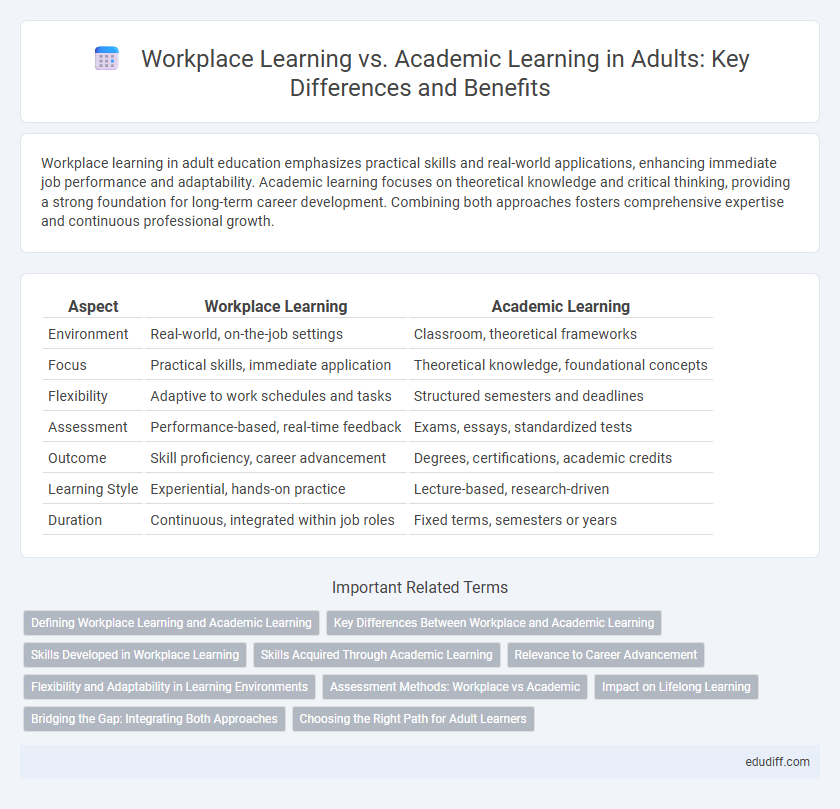Workplace learning in adult education emphasizes practical skills and real-world applications, enhancing immediate job performance and adaptability. Academic learning focuses on theoretical knowledge and critical thinking, providing a strong foundation for long-term career development. Combining both approaches fosters comprehensive expertise and continuous professional growth.
Table of Comparison
| Aspect | Workplace Learning | Academic Learning |
|---|---|---|
| Environment | Real-world, on-the-job settings | Classroom, theoretical frameworks |
| Focus | Practical skills, immediate application | Theoretical knowledge, foundational concepts |
| Flexibility | Adaptive to work schedules and tasks | Structured semesters and deadlines |
| Assessment | Performance-based, real-time feedback | Exams, essays, standardized tests |
| Outcome | Skill proficiency, career advancement | Degrees, certifications, academic credits |
| Learning Style | Experiential, hands-on practice | Lecture-based, research-driven |
| Duration | Continuous, integrated within job roles | Fixed terms, semesters or years |
Defining Workplace Learning and Academic Learning
Workplace learning refers to the acquisition of skills and knowledge through practical, on-the-job experiences and real-world problem-solving within a professional environment. Academic learning involves structured education delivered in formal settings such as universities or colleges, emphasizing theoretical understanding and foundational concepts. The key distinction lies in workplace learning's focus on applied competence and immediate job relevance, whereas academic learning prioritizes comprehensive theoretical knowledge and critical thinking development.
Key Differences Between Workplace and Academic Learning
Workplace learning emphasizes practical skills, real-world problem solving, and immediate application, while academic learning focuses on theoretical knowledge, structured curricula, and assessment through exams or essays. Workplace learning is often informal, driven by on-the-job experiences, mentoring, and collaboration, contrasting with the formal settings and standardized evaluation found in academic environments. Key differences also include the goal orientation, where workplace learning targets job performance enhancement, whereas academic learning aims for broad intellectual development and critical thinking.
Skills Developed in Workplace Learning
Workplace learning develops practical skills such as problem-solving, communication, and teamwork through real-world application and hands-on experience. This form of learning enhances industry-specific competencies and adaptability, fostering critical thinking and decision-making under actual work conditions. Unlike academic learning, workplace training emphasizes continuous skill development aligned with organizational goals and immediate job requirements.
Skills Acquired Through Academic Learning
Academic learning primarily develops theoretical knowledge and critical thinking skills essential for problem-solving in professional environments. It emphasizes foundational concepts, research methodologies, and analytical abilities that support lifelong learning and adaptability. Mastery of these skills through academic education equips adults to effectively interpret complex information and apply evidence-based approaches in the workplace.
Relevance to Career Advancement
Workplace learning provides practical skills and real-time problem-solving experiences directly aligned with current industry demands, enhancing immediate job performance and career progression. Academic learning offers foundational theories, critical thinking, and comprehensive knowledge essential for long-term professional development and adaptability in evolving fields. Combining both approaches maximizes career advancement by integrating hands-on expertise with conceptual understanding.
Flexibility and Adaptability in Learning Environments
Workplace learning offers greater flexibility by allowing adults to acquire skills directly relevant to their job roles, adapting to real-time challenges and changing industry demands. Unlike academic learning, which follows a fixed curriculum and schedule, workplace learning environments provide personalized and situational experiences that support continuous development. This adaptability enhances learners' ability to apply knowledge practically, fostering immediate integration and improved performance in professional settings.
Assessment Methods: Workplace vs Academic
Workplace learning assessment methods emphasize performance-based evaluations such as practical tasks, real-time problem solving, and direct feedback from supervisors to measure competency and job readiness. Academic learning assessment relies heavily on standardized tests, written exams, and theoretical assignments to gauge understanding and retention of knowledge. The contrast in assessment strategies highlights a focus on applied skills and immediate applicability in workplace learning, whereas academic learning prioritizes knowledge acquisition and critical thinking skills.
Impact on Lifelong Learning
Workplace learning fosters practical skills and real-time problem solving, enhancing adaptability and continuous professional growth critical for lifelong learning. Academic learning provides foundational theories and structured knowledge that support critical thinking and informed decision-making throughout one's career. Combining both approaches maximizes lifelong learning by integrating experiential insights with systematic understanding.
Bridging the Gap: Integrating Both Approaches
Workplace learning emphasizes practical skills and real-time problem-solving, while academic learning offers theoretical foundations and critical analysis. Bridging the gap involves creating hybrid programs that combine hands-on experience with formal education, enhancing both competence and conceptual understanding. Integrating mentorship, project-based tasks, and academic coursework fosters continuous professional development and adaptable expertise.
Choosing the Right Path for Adult Learners
Workplace learning offers adult learners practical skills directly applicable to their current job roles, enhancing productivity and career growth through on-the-job experiences and mentorship. Academic learning provides a structured environment that deepens theoretical knowledge and critical thinking skills, often required for career shifts or long-term professional development. Evaluating individual goals, time availability, and industry demands helps adult learners choose between experiential workplace learning and formal academic programs to maximize skill acquisition and career advancement.
Workplace learning vs Academic learning Infographic

 edudiff.com
edudiff.com